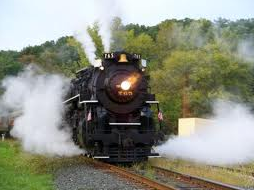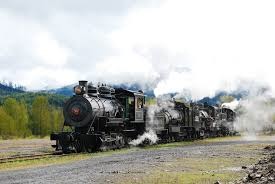THE FIRST TRAIN

June 1914
His name was Nathan Lopatin! He was my grandfather's youngest brother and the great uncle I was never to meet. He had been spirited out of Russia by family and friends, in 1903, when it was discovered by the local, Russian authorities that he and others were training in secret with rifles to protect their families and neighbors against raiding cossacks. Being caught meant certain imprisonment or possible death.
He arrived in New York that year and in 1905 came to live on his father's farm in Freehold, New Jersey. It was on that farm, situated on the Freehold--Englishtown Road, that would prove to be where tragedy would strike nine years later. I would not be born until October 1928, fourteen years after the event. Yet, Nathan, his wife Rebecca and their two children have become part of my psychological makeup. They are ghosts that will always be with me. I have no idea what any of them looked like. They are faceless and yet, to me, they are very real.
As usual, when I get caught up in telling a story that is so much a part of me, I tend to get ahead of myself. So, let me move ahead in time to that tragic, June day in 1914.The Pennsylvania Railroad tracks ran between the farm and the Freehold--Englishtown Road. A narrow, farm road crossed the tracks on to the highway. They would have to cross those tracks in order to reach the highway.
First let me say what I don't know. I don't know the names and ages of the two children. My best guess is that they were under the age of seven. I base that on the fact that Nathan was not married until sometimes after 1906. I don't know the day of the week it was, which is not important to my story. Most important, to me at least, was how they came to be on those railroad tracks at that fatal moment in time.
There are two explanations. The first is that they were going on vacation or going to visit family. They had (as the story goes) forgotten a suitcase and had gone back to retrieve it. Upon crossing the railroad tracks a second time, their automobile was struck by the train. They were all killed. The second version is a simple one. Their automobile stalled on the tracks and was demolished by the on-coming train.
The unanswered questions has always been: Didn't Nathan (the driver) see the train. Did he try to race across the tracks in front of the oncoming train? When it comes down to it, none of the questions or their answers really mattered. The only thing that mattered was the fatal, end result. It was another end result that would directly affect me (almost ending my life) when another, related, tragic event was to occur nineteen years later with the second train.
***
THE SECOND TRAIN

Monday, March 13, 1933
In order to understand the catastrophic event that would take place on that March Monday in 1933 it is important to know a little of the background that led up to it. It will also help to know how a quirk of fate determined whether I would live or die on that day.
Max Lopatin was my grandfather. He arrived in New York with his wife Fanny and their first daughter, Rose, from Russia in 1906. They moved to Freehold, New Jersey in 1908. My mother, Rebecca, and her twin sisters, Nora and Gloria would be born and raised there.
Freehold was beginning to fill up with Lopatins. The families of three of the Lopatin brothers grew to the point that there were a total of 13 male and female cousins. (There were two other brothers, Nathan and David. Nathan and his wife and two children would be killed when their car was struck by a Pennsylvania Railroad train in 1914, [see THE FIRST TRAIN]) David did not move to Freehold until years later.
Freehold, in those years, was the center of a large farming area. The town itself had a population of about 7000 people. There were two shopping streets, Main Street and South Street. My grandfather’s store, the Outlet Store, was located on South Street.
Saturday night was when the farmers came into town to shop. I can still remember being in the crowded Outlet Store on Saturday nights when my mother and her sisters worked with my grandfather and grandmother to handle the large number of customers buying everything from shoes to coats and everything in between.
1933 was a depression year. Money was hard to come by. I can still remember farmers selling 100 pound sacks of potatoes on roadsides for one dollar.
The Outlet Store sold much of its merchandise on credit. The customers’ credit purchases were recorded in a ledger along side of their names and addresses. Billings and payments were not done by mail. The way my grandfather was paid was for him to “go collecting.” He would drive out, on a regular basis, to his farmer customers who owed for their purchases and collect whatever they could afford to pay. Often it would be a weekly payment of 50 cents or 75 cents. One of his joys was to take me, his almost five-year-old grandson, with him when he went collecting.
Monday, March 13, 1933 was a collecting day. As my mother related it, my grandfather told her he was going to take me with him collecting (He never asked, he told.). Here, the story gets muddled. He either picked me up at my home (after my mother had gone to the store) or my aunt Rose with my cousin Paul, got me before my grandfather came by. In any event, if he did pick me up, I must have told my grandfather that I wanted to play with my cousin Paul and he dropped me off.
That was the day he went collecting without me for company. As far as my mother knew I was with my grandfather.
It was a cold, clear, March day. There were no car heaters in those days. It was determined that his windows were closed. They hardly made the car soundproof.
What was about to happen is difficult to explain. He was crossing the New York Central Railroad tracks just north of town when his car was plowed into by the train. He died in an instant.
My mother was working in the store when she received word of her father’s tragic death and was unaware that I was at my aunt Rose’s home playing with my cousin Paul. All she knew was that I was in the car with my grandfather. I don’t know how long it took for her to find out that I was safe at her sister’s home but as she told me on several occasions, it was a time of anguish that she found hard to describe.
Two fatal train accidents on two different train lines, in the same town, 19 years apart, killing two brothers (one with his entire family) and by a quirk of fate, sparing my life.
Bob Flicker